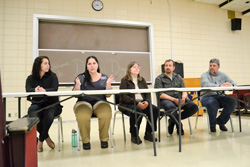Story by Cody Hall, Contributing writer

As 20th century geneticist and evolutionist Theodosius Dobzhansky said, “Nothing in biology makes sense except in the light of evolution” – a concept Murray State biology professors and students reinforced at a celebration last week.
Murray State celebrated Charles Darwin’s 207th birthday on March 10 with a Darwin Day event sponsored by Beta Beta Beta – TriBeta – a national biological honors society and the Murray State Watershed Studies Institute, a center for teaching about and researching watershed ecosystems.
The party not only featured a cake in Darwin’s honor, but a national speaker, who presented his findings about the evolution of certain snakes in Lake Erie.
Ashley Munie, junior from Breese, Illinois, and president of Murray State’s chapter of TriBeta, said this event is held every year as a way to commemorate Darwin’s contributions to the field of biology.
“It is a day devoted to his contributions to science,” Munie said. “We bring in speakers to talk about their studies in evolution. Each year the topic is different, depending on the speaker.”
Darwin’s birthday is Feb. 12, and usually the event is held on that day, but after snow caused it to be canceled, organizers moved it to March to avoid that from happening again, Munie said.
The field of evolution is constantly changing and it is important to stay updated. For people who are not biology majors, it is important to attend events like this because it is a chance for people to discuss and ask questions without being spoken down to, Munie said.
Chris Trzepacz, biology professor and academic adviser for TriBeta, said it is important to learn about and teach evolution.
“It teaches us logic,” Trzepacz said. “To have a clear understanding about anything you have to approach it logically and scientifically. And evolution reinforces the idea of the scientific method. It helps us understand our place in this world. The theory of evolution shows us how big of a family we are.”
This is a time in life when students are able to see and learn from experts in their fields. Outside of college, opportunities like this will not be as available, Trzepacz said.
This year Rich King, from the department of biology at Northern Illinois University, presented the findings of his research project on snakes in Lake Erie in a paper called “Detecting natural selection in real time: Implications for evolutionary responses in a changing world.”
After comparing snakes from an island to those of the same species on the mainland, he found a difference in their color patterns. King suggested the snakes separated from the mainland and changed to better fit their environment.
Because of the changes in climate, we are seeing a shift in different species and in years to come there will most likely be some that cannot evolve fast enough, either becoming extinct or endangered, King said.
Rachel Mittelman, visiting assistant professor of history, said there is evidence that climate change has even affected human civilizations in the modern world.
“In the archaeological record, we can track climate change,” Mittelman said. “In the Mediterranean, there was a massive demographic shift. People from the Aegean Sea area moved all over the Mediterranean. There has been famine in Syria for quite some time, and the people are fleeing because of it.”